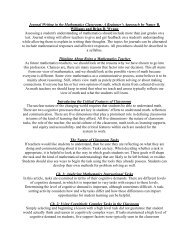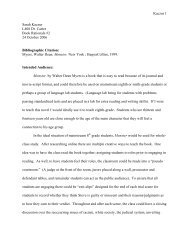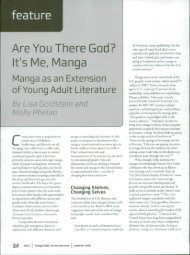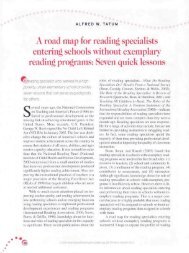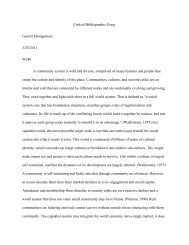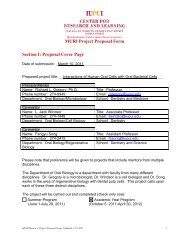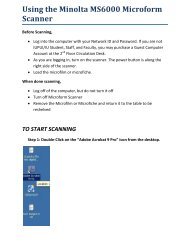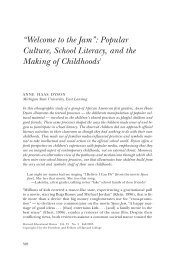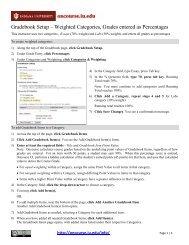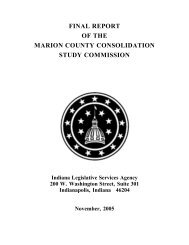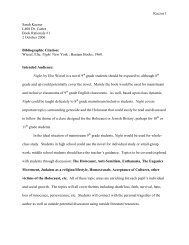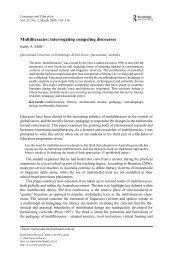Grauerholz 2003 Assessing critical thinking sociology.pdf - Oncourse
Grauerholz 2003 Assessing critical thinking sociology.pdf - Oncourse
Grauerholz 2003 Assessing critical thinking sociology.pdf - Oncourse
- No tags were found...
You also want an ePaper? Increase the reach of your titles
YUMPU automatically turns print PDFs into web optimized ePapers that Google loves.
CRITICAL SOCIOLOGICAL THINKING 491each of the items tested. Next, we performedfactor analysis of all items to determinewhether the items loaded separately oron two or more factors. This analysis canhelp us determine empirically whether theseitems are part of the same construct or differentones. We utilized a principal componentanalysis using varimax with Kaisernormalization for rotation. We also presentresults of reliability analysis to illustrateadditional properties of the scale.FINDINGSTable 1 presents the means and standarddeviations for each of the items used tomeasure <strong>critical</strong> sociological <strong>thinking</strong>. Thescores ranged from a high of 4.2 (examplesused are pertinent/relevant to argument) to alow of 1.8 (indicates awareness of crossculturalcontexts). The high mean scores formost items suggest that students tended toperform fairly well (a mean of 4.0 would becomparable to a "B").The bivariate correlations, shown in Table2, illustrate that many items are closelyrelated to each other. Indeed, when the factoranalysis was conducted, we found thatmost of the indicators loaded on a singlefactor (see Table 3). Further, the factoranalysis suggests that these measures werenot factorially pure. Two items--"indicatesan awareness of historical contexts" and"indicates an awareness of cross-culturalcontexts"-loaded on a separate factor. Athird item, "appeals to prejudices, prevailingopinion, feelings or personal experience"(bias), produced weak loadings onboth factors.In the final analysis, we omitted the threeitems that did not load on the first factor.The result was an eight-item scale consistingof: 1) uses examples, 2) examples arepertinent/relevant to argument, 3) reasoning,4) considers two sides of an issue, 5)indicates an awareness of social structural(e.g., class, gender, age, race, religion, sexorientation) contexts, 6) uses sociologicalconcepts to illuminate and analyze the issue,7) demonstrates <strong>critical</strong> <strong>thinking</strong>, and 8)Table 1. Means and standard deviations for<strong>critical</strong> sociolo-ical <strong>thinking</strong> items.StandardMean DeviationUses examples 4.05 1.00Examples pertinent 4.20 1.04Reasoning 3.73 1.06Bias 4.00 1.05Two-sides 3.83 .93Aware social structure 3.99 1.00Aware historical contexts 3.60 1.49Aware cross-cultural 1.80 1.30Use sociological concepts 4.08 1.04Critical <strong>thinking</strong> (holistic) 3.76 .99Sociological imagination(holistic) 3.87 1.04demonstrates sociological imagination. Asseen in Table 4, these items are highly correlatedand the alpha coefficient for thisscale was very high (.95). Thus, the itemswere summed and divided by 8, so that thetheoretical range was 1-5. The mean scorefor the scale was 3.94 with a standard deviationof .873.DISCUSSIONDevelopment of students' <strong>critical</strong> <strong>thinking</strong>abilities is considered to be a core learninggoal in <strong>sociology</strong>. For decades scholarshave explored creative strategies to helpstudents achieve this goal. Unfortunately,despite this attention, the concept of <strong>critical</strong><strong>thinking</strong> has remained unclear. Further, fewsociologists have attempted to test empiricallywhether such strategies are effective inenhancing <strong>critical</strong> <strong>thinking</strong>. In fact, fewmeasures of <strong>critical</strong> <strong>thinking</strong> in <strong>sociology</strong>have been developed to facilitate this typeof discovery.In this study, we considered some of thevarious ways sociologists have defined <strong>critical</strong><strong>thinking</strong>. We propose the concept of"<strong>critical</strong> sociological <strong>thinking</strong>" to refer tothe ability to evaluate, reason, and question



